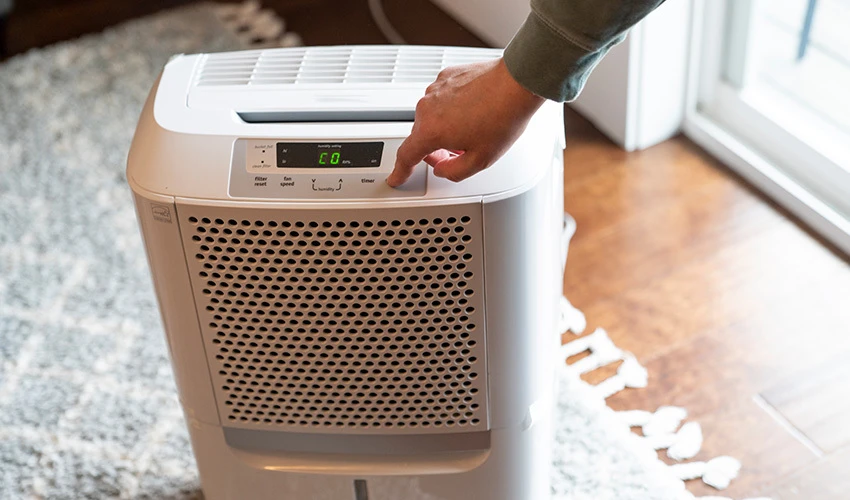How to Use a Dehumidifier

Dehumidifiers are important in the fight against overly humid air and poor indoor air quality. Not only do they reduce excess moisture in the air, but they also they work to prevent mold and mildew.
When a room is less humid, it’s more comfortable and pleasant and safe to spend time in.
With these factors in mind, let’s take a deeper dive into how dehumidifiers work, how to pick one for your home, and some of the benefits they bring.
What Is a Dehumidifier and How Does a Dehumidifier Work?
A dehumidifier is an electrical appliance that reduces and maintains the optimal level of humidity in the air. There are three types available to homeowners.
Each works to remove water from the air a little differently:
- Refrigerant dehumidifiers
Refrigerant dehumidifiers work by drawing warm, moist air into the unit, via a fan. The moist air then crosses over refrigerant-cooled coils. These coils condense the air to remove excess water content. The unit then releases recycled, less-humid air back into the room with the help of a second fan. - Desiccant dehumidifiers
Typically, smaller and lighter in weight than refrigerant dehumidifiers, desiccant dehumidifiers utilize a desiccant wheel (made of a material similar to the silica gel you may find in a shoebox) to absorb water in the air. - Whole-house dehumidifiers
A whole-house dehumidifier is very similar to a refrigerant dehumidifier, but it is included as part of a home’s overall HVAC system. These systems are typically less expensive to run and maintain but are not practical to install unless you’re installing or replacing the entire HVAC system.
Top 3 Benefits of Dehumidifiers
Not sure how a dehumidifier could benefit your life? Read on to learn the top three ways a dehumidifier may improve your home and health …
- Provides a Less Humid Space
All rooms big or small may benefit from the use of a dehumidifier. Rooms with poor ventilation are particularly prone to moisture and humidity problems. These rooms, especially bathrooms and basements, benefit greatly from the use of dehumidifiers.
If you notice any of the following in your home, we recommend purchasing and using a dehumidifier(s):
- Damp patches
- Mold
- Mildew or a musty smell
- Condensation on the inside of your window panes
- Improves Your Health and Protects Your Home
Humid air traps dust, dirt, and allergens that then circulate it in your home. This exacerbates problems for individuals who suffer from asthma and allergies. Reducing high humidity levels greatly improves the lives of everyone in a home, but especially those who are most impacted by poor air quality. It also prevents mold and mildew, which are not only pollutants, but can cause serious damage to your home. - Provides Comfort
Humid air can feel heavy and oppressive. Reducing the level of humidity in a space in the summer makes it feel cooler and more comfortable during the sticky summer months.
What Size of Dehumidifier Do I Need?
The two most significant factors that determine the size of the dehumidifier you'll need are 1) the size of the space you're looking to dehumidify and 2) the humidity level within that space.
Guidelines suggest that slightly damp rooms, with a 50-60% humidity level, require a 20-pint dehumidifier for a 300-square-foot space. In contrast, a 50-pint dehumidifier is recommended for a 1,200-square-foot space with the same humidity level.
If the room you’re trying to dehumidify has a humidity level between 80-100%, then a 25-30-pint dehumidifier is recommended for a 300-square-foot space, while a 60-pint dehumidifier is recommended for a 1,200-square-foot space with the same humidity level.
Choose the Dehumidifier That’s Right for You
Our local service professionals are ready to help you choose the unit that’s right for you. Call Aire Serv® today at or request an appointment online to learn more about your dehumidifier options.
 Click to call
Click to call


